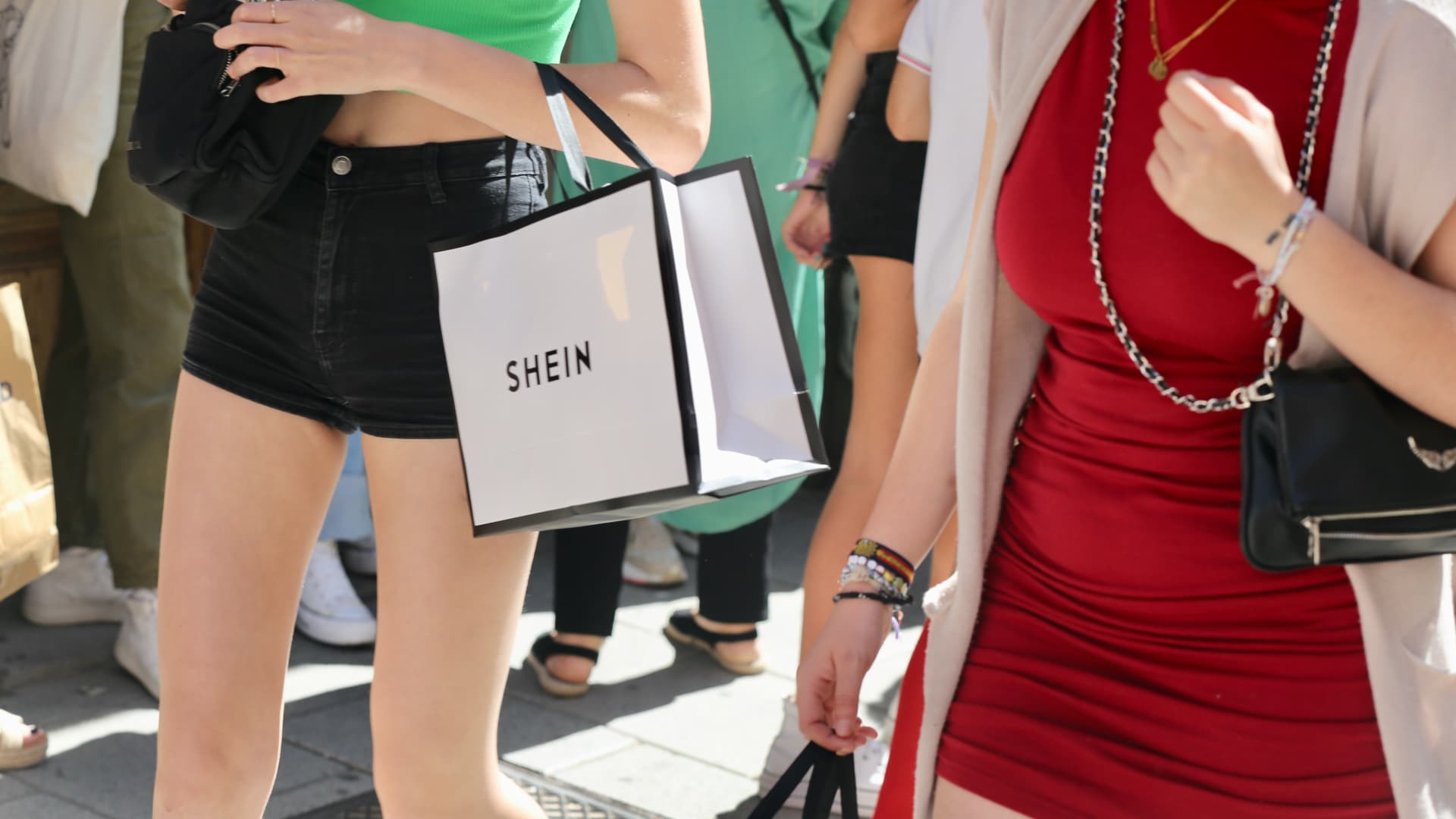A woman proudly carrying a Shein bag as she enters the brand’s first physical store in Madrid, June 2, 2022.
Photograph by Europa Press News / Contributor
Shein, the renowned fast-fashion brand, is now facing increased scrutiny from U.S. elected officials who demand proof that the company does not utilize forced labor before its widely anticipated initial public offering (IPO).
Last week, attorneys general from 16 states sent a letter to the U.S. Securities and Exchange Commission Chair Gary Gensler, urging the agency to ensure compliance with U.S. law by Shein and other foreign companies before granting them permission to trade on American exchanges.
The letter, composed by Montana’s Attorney General Austin Knudsen and endorsed by 15 other Republican attorney generals, stated, “It is evident that SHEIN intends to launch an IPO before the end of this year. An IPO of this magnitude, involving a foreign-owned company facing legitimate concerns about its core business practices, cannot proceed based on self-certification alone.”
“We urge you to require, as a prerequisite for listing on a U.S.-based securities exchange, that any foreign-owned company certifies, through an genuinely independent process, its compliance with Section 307 of the Tariff Act of 1930, which prohibits the importation of products manufactured, wholly or partially, by forced labor,” the letter continued.
The letter was dispatched on the same day Shein announced its acquisition of a stake in Sparc Group, the parent company of Forever 21.
Shein has faced allegations of utilizing forced labor from China’s Xinjiang region to fuel its rapid success as rumors circulate regarding its plans to go public. While the company’s supply chain has a significant presence in China, where it was founded, U.S. law prohibits imports from Xinjiang due to the widespread human rights abuses against Uyghur Muslims in the region.
Furthermore, Shein is currently under investigation by the House Select Committee on the Chinese Communist Party, which has accused the brand of evading U.S. tariff laws. As bipartisan U.S. lawmakers increasingly scrutinize Chinese companies or those with potential ties to the Chinese government, Shein finds itself in the midst of this ongoing probe.
The letter referenced a Bloomberg report published last year, which revealed, through independent testing, that some Shein clothes were made with cotton sourced from the Xinjiang region.
Shein has faced significant backlash as a result of these allegations, posing a major obstacle that the retailer must overcome in order to expand its presence in the U.S. and proceed with its plans for an IPO.
Initially, Shein and its executives seldom made public statements. However, in response to the situation, the company has been more open with the press and has acknowledged to CNBC that some of its cotton supply originates from the Xinjiang region.
In an effort to verify the origin of its cotton, Shein partnered with the supply chain tracing firm Oritain, which claims it can trace the source of cotton fibers back to specific farms. Between June 2022 and July 2023, Shein conducted 2,111 tests, of which 46 yielded positive results, accounting for a 2.1% rate of products originating from banned regions, according to Peter Pernot-Day, Shein’s head of strategy and corporate affairs.
“When we identify a raw material that tests positive, we remove it from production,” Pernot-Day stated.
Oritain, an independent firm, verified these results to Politico and confirmed that Shein has performed better than the industry average when it comes to testing cotton samples. During a recent industry-wide testing round, Oritain discovered that 12% of samples were positive for originating from an “unapproved region,” as previously reported by Politico.
Pernot-Day emphasized that Shein’s primary objective at present is to reduce its positive test results to zero. To achieve this, the company is conducting monthly testing at all 40 of its mills and has ceased purchasing cotton from China entirely.
Denial of responsibility! VigourTimes is an automatic aggregator of Global media. In each content, the hyperlink to the primary source is specified. All trademarks belong to their rightful owners, and all materials to their authors. For any complaint, please reach us at – [email protected]. We will take necessary action within 24 hours.


